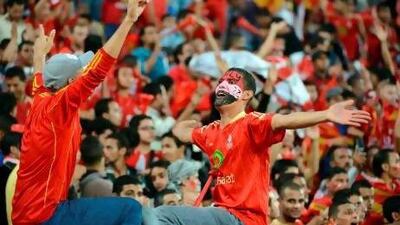Across the world, it seems nothing defines a country, rightly or wrongly, more than the perception of its football supporters.
Very often it is an unflattering perception. But fans are invariably a symptom of the society they inhabit, and not a cause of its social ills.
Today, perhaps no country defines such intertwining of politic and sports more than Egypt. The Ultras of Egypt's most famous club Al Ahly, known as the Ahlawy, provide an accurate representation of a country stuck in political and social flux following last year's January 25 revolution that ended Hosni Mubarak's three-decade dictatorship.
On the few occasions the Cairo club take to the field these days, the Ahlawy, like the coveted social progress Egyptians demand, are nowhere to be seen.
Indeed, the Ahlawy have not attended a match since the Port Said Stadium disaster claimed the lives of 74 fans on February 1, 2012 when armed thugs invaded the away stands after the final whistle of a match between Al Ahly and Al Masry.
That is partly because the Egyptian League has been suspended. But when matches have taken place in the Confederation of African Football Champions League, they have been behind closed doors.
On Sunday, 20,000 were allowed into an army stadium in Alexandria for the CAF Champions League final first leg against Esperance of Tunisia. As Al Ahly salvaged a 1-1 draw in the dying minutes, the roar of the Ahlawy was again conspicuous by its absence.
It is an eerie reminder of how much sports and politics mix in Egypt, such an occasion merely a sideshow for more important issues taking place in the country.
But make no mistake, this remains a massively important tournament and the Ahlawy remain as loyal to their club as ever. Al Ahly hold the record for most titles in this competition, with six wins.
Esperance, increasingly one of Al Ahly's biggest rivals on the African scene, are the CAF Champions League holders, having defeated Wydad Casablanca of Morocco last year. But these days, the Ahlawy's concerns extend beyond winning football matches. In a way, they always have.
Al Ahly's local rivalry with Zamalek is one of world football's most intense, and often descended into violence among the teams' followers.
The divide may be simplistic, but is ingrained in Egyptian culture. Al Ahly, the working class club. Zamalek, the rich boys' team.
It is this position as the people's club that has led to the impasse. The Ahlawy's ability to mobilise protests was credited, or blamed by many, for being a major factor in bringing down Mubarak.
The Ultras, meanwhile, are convinced that the Port Said attack was retaliation by remnants of the old regime, a belief strengthened by the lack of genuine progress in the investigation to find what happened that day.
Civil disobedience has characterised Egyptian life since Mubarak's fall, the revolution's early optimism quickly giving way to the realisation that real change had not been forthcoming. Echoing Egyptians' continued opposition to the status quo, the Ultras have boycotted the few matches the club has played since.
The suspension of the Egyptian League, like the halt to many aspects of everyday life in Egypt, could have devastating long-term consequence on the football in the country. But Al Ahly's fans stand firm.
On Sunday, the club travel to Tunis for the second leg of the CAF Champions League final, and a win could provide its fans, and the country at large – with the exception of Zamalek's supporters perhaps – a major, if temporary, boost to sagging morale.
Football, perhaps more than anything else, retains the power to raise spirits, to unite people and, briefly at least, take their minds off domestic strife. Iraq's astonishing victory in the AFC Asian Cup in 2007 was one such example, Sunnis, Shia and Kurds rallying behind the Lions of Mesopotamia.
And earlier this year, little-fancied Zambia overcame mighty Ivory Coast, Didier Drogba et al, to win the African Cup of Nations in Libreville, Gabon, a short distance from where their team had been decimated by a plane crash in 1993.
The victory was dedicated to those fallen footballers.
It should also not be forgotten that, Tunisia is itself emerging from decades of dictatorship, although its fledgling democracy's growing pains have been considerably less traumatic than Egypt's. Still, another triumph for Esperance would once again strike a major blow for their national pride.
For Al Ahly's fans, the priorities are different.
Certainly, the Ahlawy maintain that a win on Sunday would be the perfect tribute to those perished in Port Said that fateful day. No doubt, a triumph would be ecstatically celebrated. Just don't expect it to distract the Ahlawy from the real issues.
Justice for the 74 remains the ultimate goal.
Follow us

